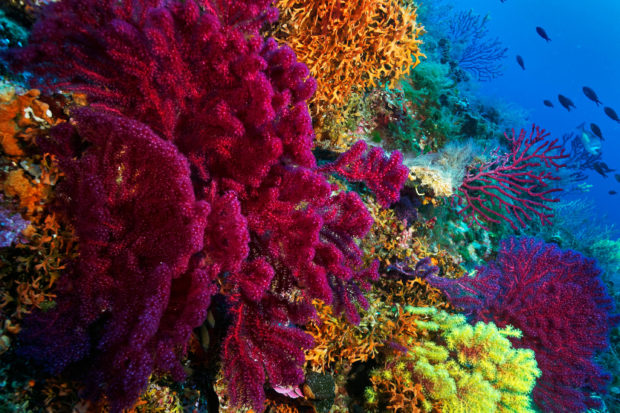A coral’s color may tell of its resilience to climate change—study

Coral reefs provide shelter and protection for hundreds of species of fish and crustaceans. Image: goran_safarek/Shutterstock
According to scientists in Japan, a coral’s color can tell of its resilience to climate change. The yellow-green color morph of a given species of coral was found to resist higher temperatures more effectively than the brown color morph.
If you’ve dived in the Pacific Ocean or the Red Sea in recent years, you may have been struck by the amount of white coral reefs. These underwater structures are under threat from climate change and marine pollution. This can cause coral to turn a ghostly white color — a phenomenon called bleaching — and ultimately die.
Coral reefs provide shelter and protection for hundreds of species of fish and crustaceans. One species of coral that is particularly threatened by rising ocean temperatures is Acropora tenuis, which known to have three color morphs: brown, purple and yellow-green.
According to a new study from the Okinawa Institute of Science and Technology (OIST) Graduate University in Japan, these different colors could play more than a purely aesthetic role, as they appear to signal the coral’s resilience to climate change.
The study authors focused on different color morphs of Acropora tenuis coral grown for around 20 years in an aquarium. Their aim was to observe the coral over the last two decades and determine their resilience to climate change, as well as the underlying causes.
The yellow-green color morph more resilient to climate change
“At first, we thought the difference in resilience might be linked to the corals housing different kinds of symbiotic algae, which photosynthesize for the coral and thus provide the coral with energy. Previous research has shown that some symbiotic algae are more resilient to climate change than others. But when we looked at the three-color morphs, we found that they all housed very similar algae,” explains Professor Noriyuki Satoh, who led the study.
The scientists found that corals with yellow-green color morph were the most resilient to climate change. This difference could be explained by the existence of proteins present at higher levels in the green-colored corals, helping to protect their symbiotic algae and to withstand higher temperatures.
On the other hand, corals with the brown color morph, which have the lowest levels of these proteins, appeared to be the most vulnerable to climate change. Corals with the purple color morph fell between the brown and yellow-green morphs.
“Coral reefs are so important for biodiversity. Finding out more about them will help us to conserve them. Right now, we cannot help so much about the coral reef situation but gathering this fundamental knowledge, understanding how corals work, is very important for long-term conservation,” concludes Professor Satoh, who hopes to carry out further research to explore these discoveries in greater detail. NVG
RELATED STORIES:
Yellow penguin snapped by wildlife photographer: ‘How lucky could I be!’